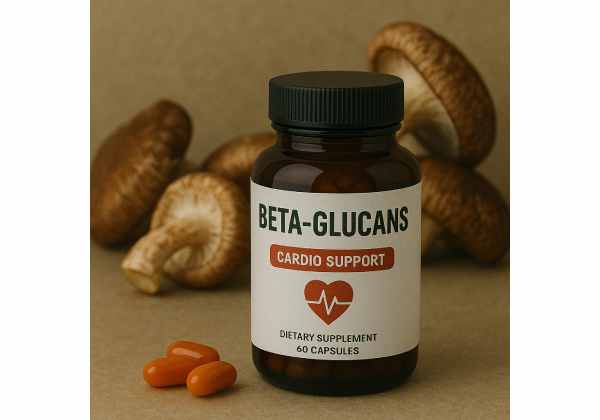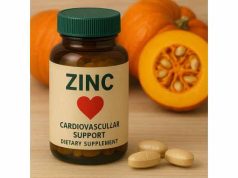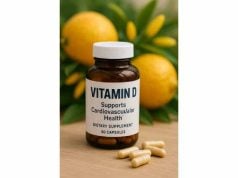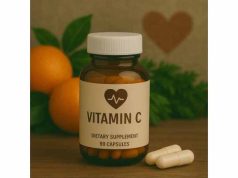
Beta-Glucans are natural compounds recognized for their remarkable impact on cardiovascular function. Whether you’re concerned about maintaining healthy cholesterol levels, enhancing arterial flexibility, or pursuing comprehensive heart wellness, Beta-Glucans have garnered widespread attention as a supplement for Heart Health. In this article, we explore the science behind how Beta-Glucans help support Cardiovascular Health and Vascular function, illuminate their many advantages, and offer practical guidance on usage and dosage. Prepare to discover how these unique polysaccharides can help optimize your cardiovascular function and fortify your journey toward a healthier, more vibrant life.
Table of Contents
- In-Depth Profile of Beta-Glucans
- How Beta-Glucans Support the Body
- Science-Backed Heart Health Benefits
- Dosage, Usage, and Safety Tips
- Frequently Asked Questions
- References and Sources
In-Depth Profile of Beta-Glucans
Beta-Glucans are a class of soluble fibers found primarily in the cell walls of various organisms, including oats, barley, mushrooms, and certain types of yeast. They belong to the broader category of polysaccharides, which are complex carbohydrates composed of long chains of glucose molecules. Because of their unique molecular structure, Beta-Glucans possess health-enhancing properties that set them apart from many other dietary fibers.
Where Beta-Glucans Come From
- Cereal Grains
- Oats: Oats are perhaps the most widely known source of Beta-Glucans. The concentration can be particularly high in oat bran, making oats an excellent component in heart-friendly diets.
- Barley: Barley is another exceptional source of Beta-Glucans, and it often provides a slightly different structural variant that can influence its solubility and health effects.
- Fungi and Yeasts
- Mushrooms: Certain mushrooms, such as shiitake and reishi, are valued not only for their Beta-Glucans content but also for their overall immune-supportive compounds.
- Yeast: Baker’s yeast and brewer’s yeast contain Beta-Glucans that can be extracted and supplemented. Yeast-derived Beta-Glucans have been widely studied for their immunomodulatory benefits.
Molecular Structure and Types of Beta-Glucans
Beta-Glucans feature glucose units linked by beta-glycosidic bonds. However, the specific type of linkage—commonly referred to as (1→3) or (1→4) or (1→6)—dictates the compound’s molecular shape and biological activity. Generally, Beta-Glucans derived from grains (like oats and barley) exhibit a combination of (1→3) and (1→4) linkages, which contributes to their cholesterol-lowering impact. Meanwhile, Beta-Glucans from mushrooms or yeast may have more (1→6) linkages, often impacting immune responses. Despite these differences, all Beta-Glucans share the capacity to absorb water, turn into a gel-like substance, and support various bodily functions.
Nutritional and Functional Properties
- High Solubility in Water
The soluble nature of Beta-Glucans allows them to form gels when combined with water. This gelling characteristic slows digestion, helps modulate the absorption of certain nutrients—particularly cholesterol—and offers a sensation of fullness. - Prebiotic Potential
As fiber, Beta-Glucans can serve as prebiotics, meaning they help feed beneficial gut microbes. A thriving gut microbiome is linked to better nutrient absorption and can also have a ripple effect on metabolic and cardiovascular health. - Cholesterol Management
One of the most prominent aspects of Beta-Glucans for Cardiovascular Health is their ability to help reduce LDL (low-density lipoprotein), often referred to as “bad cholesterol.” This function is a cornerstone of Beta-Glucans’ significance in heart-related supplementation. - Immune System Support
Beta-Glucans are frequently studied for their immunomodulatory impact. Specific Beta-Glucans, especially those extracted from mushrooms or yeast, may help regulate immune responses by activating cells involved in pathogen defense.
Why Beta-Glucans Matter for Heart Health
Individuals seeking ways to maintain or improve heart health often consider Beta-Glucans due to their direct influence on factors such as blood lipid profiles and vascular function. By integrating Beta-Glucans into your daily regimen—either through diet or supplements—there is potential to experience a noticeable improvement in markers of cardiovascular wellness. Because they also offer general health advantages, Beta-Glucans are increasingly recognized as a holistic, multifaceted approach to wellness that goes beyond simple cholesterol control.
The Role of Beta-Glucans in Modern Diets
Modern diets often lack sufficient quantities of soluble fiber. Ultra-processed foods and inadequate vegetable, fruit, or whole grain consumption can leave individuals deficient in the essential nutrients that keep the heart functioning optimally. Beta-Glucans provide a means to make up for some of these shortcomings, supporting essential body processes like healthy blood sugar regulation and stable cholesterol levels, both of which have direct implications for cardiovascular well-being.
Historical and Cultural Significance
- Ancient Grains: Oats and barley have been staples in many ancient civilizations. A diet rich in these whole grains may have contributed to lower rates of heart-related issues in populations that subsisted heavily on such natural foods.
- Folk Medicine: Mushrooms containing Beta-Glucans have been prized in traditional healing practices worldwide—particularly in East Asia—for their immune-enhancing properties.
Summary
Beta-Glucans are more than just another fiber. They are specialized compounds that interact with the body in complex ways, positively influencing cholesterol metabolism, immune responses, and gut health. Their multifaceted role places them squarely at the intersection of nutritional science and cardiovascular support, making them a prime candidate for anyone determined to enhance their heart health and overall vitality.
How Beta-Glucans Support the Body
Understanding how Beta-Glucans work inside the body begins with their interaction within the gastrointestinal tract. From there, they initiate a series of biochemical responses that extend far beyond simple digestion.
Gelling Effect and Slowed Nutrient Absorption
Once ingested, Beta-Glucans draw water and form a gel-like substance in the gut. This gel slows the rate at which nutrients, including sugars and fats, are absorbed. Gradual nutrient absorption helps maintain stable blood sugar levels and optimizes cholesterol management. Stable blood sugar levels also help stave off energy crashes and reduce the likelihood of developing insulin resistance.
- Blood Sugar Regulation:
By slowing carbohydrate digestion, Beta-Glucans help prevent sudden spikes in blood glucose, which is beneficial for both metabolic and cardiovascular health. - Promoting Satiety:
The viscosity of Beta-Glucans contributes to a sense of fullness. Feeling satiated after meals can help manage caloric intake, an important aspect of weight control and heart health.
Interaction with Lipids
A critical factor in Beta-Glucans’ impact on heart health is their interaction with lipids like cholesterol. The gel matrix formed by Beta-Glucans in the intestine can bind to bile acids, which contain cholesterol. As these bound bile acids are excreted, the body compensates by pulling more cholesterol from the bloodstream to produce new bile acids, thus reducing circulating LDL cholesterol levels.
- LDL Reduction: Studies show that daily consumption of Beta-Glucans can lead to measurable decreases in LDL cholesterol, which is directly associated with cardiovascular disease risk.
- Improved Lipid Ratios: Beyond LDL reduction, Beta-Glucans have been noted to help maintain or slightly increase HDL (“good” cholesterol), thereby improving the overall cholesterol ratio—a key marker of cardiovascular well-being.
Prebiotic Influence and Gut Microbiome Enhancement
Beta-Glucans also function as prebiotics, fueling beneficial microbes. A robust microbiome is known to support various bodily systems, including immune function. These microbes can ferment Beta-Glucans into short-chain fatty acids like butyrate, which play a role in gut lining integrity and systemic inflammation reduction—both crucial for heart health.
- Enhanced Immune Response:
Certain immune cells respond positively to Beta-Glucans, helping the body combat pathogens. A healthy immune system, in turn, can keep inflammatory processes in check, reducing stress on the cardiovascular system. - Gut Lining Strength:
The short-chain fatty acids produced through fermentation strengthen the intestinal barrier, preventing harmful molecules from entering the bloodstream and provoking inflammatory cascades.
Antioxidant and Anti-Inflammatory Roles
Though not traditionally classified as antioxidants, Beta-Glucans can contribute to a lower oxidative stress environment. By promoting balanced gut microbiota and supporting immune activity, they can indirectly minimize systemic inflammation and oxidative damage—key factors in the progression of heart ailments.
Hormonal Balance and Endocrine Function
Emerging research suggests that the improved gut environment and lowered systemic inflammation facilitated by Beta-Glucans may also have subtle influences on hormonal regulation. Stable blood sugar levels, balanced cholesterol, and a well-functioning liver all feed into the broader endocrine system, optimizing hormone production and metabolism.
Synergies with Other Nutrients
Beta-Glucans can work in concert with other bioactive compounds commonly found in whole foods. For instance, pairing Beta-Glucans with antioxidants in fruits or with minerals in green vegetables can further enhance nutrient absorption and metabolic health. Combining Beta-Glucans for Cardiovascular Health with other protective elements—such as Omega-3 fatty acids or plant sterols—may produce cumulative gains for the entire circulatory system.
Mechanisms Specific to Cardiovascular Support
- Arterial Flexibility:
Lower cholesterol and reduced inflammation can translate to more flexible and resilient arteries, promoting efficient blood flow and lessening the burden on the heart. - Blood Pressure Regulation:
While Beta-Glucans are best known for cholesterol management, some studies point toward subtle improvements in systolic and diastolic blood pressure, likely due to overall improvements in vascular function. - Endothelial Protection:
The endothelium lines the inside of blood vessels, directly impacting vascular health. By tempering inflammation and supporting healthy lipid metabolism, Beta-Glucans help preserve endothelial function.
Why Mechanisms Matter
Comprehending the multifaceted mechanisms behind Beta-Glucans clarifies why they are so frequently recommended for heart and vascular support. Their effects are not confined to just one system; instead, they engage the digestive, immune, and endocrine systems, orchestrating a synergistic environment that favors heart health. By targeting several processes—cholesterol clearance, blood sugar regulation, gut health, and immune function—Beta-Glucans deliver a broad-spectrum approach to maintaining cardiovascular resilience.
Science-Backed Heart Health Benefits
Beta-Glucans have undergone extensive scientific evaluation for their cardiovascular impacts. As more studies emerge, the evidence continues to accumulate, showcasing the far-reaching ways in which Beta-Glucans Benefits for Heart Health can make a real difference.
Cholesterol Management and Beta-Glucans
A consistent finding across multiple clinical trials is that Beta-Glucans help reduce total cholesterol, especially LDL cholesterol. By binding to bile acids in the intestine, Beta-Glucans enhance the body’s natural mechanism for eliminating cholesterol. Several meta-analyses have concluded that even moderate daily intake—such as 3 grams of Beta-Glucans from oats—can significantly lower LDL levels over time.
- Key Study Outcomes:
- A notable decrease in LDL levels ranging from 5% to 10% after consistent supplementation.
- Improved total cholesterol to HDL ratio, marking a healthier lipid profile.
Blood Pressure Reduction
While research on Beta-Glucans and blood pressure is less extensive than cholesterol studies, preliminary findings are encouraging. A combination of reduced LDL, improved arterial elasticity, and moderated inflammatory processes suggests Beta-Glucans may contribute to healthier blood pressure levels, though individual results can vary.
- Potential Mechanisms:
- Reduced vascular inflammation leads to more relaxed blood vessels.
- Better lipid management lowers plaque formation risks, alleviating arterial stress.
Support for Blood Vessels and Vascular Function
When blood vessels remain flexible, the heart can pump blood more efficiently. Beta-Glucans appear to enhance endothelial health and reduce oxidative stress, creating a more favorable environment for overall vascular function.
- Plaque Formation Inhibition:
Lower LDL and improved HDL cholesterol levels reduce the likelihood of plaque deposits building up in arterial walls, a leading factor in atherosclerosis. - Vascular Inflammation:
By indirectly regulating inflammatory markers, Beta-Glucans can help minimize endothelial damage.
Potential Arrhythmia and Stroke Prevention
Though more studies are needed, some researchers postulate that better cholesterol management, reduced oxidative stress, and lower inflammation collectively diminish the chances of life-altering cardiovascular events. By improving the fundamentals of heart health—such as stable cholesterol levels and healthy vessel function—Beta-Glucans might contribute to a decreased risk of arrhythmias or stroke over the long term.
Synergy with Other Heart-Healthy Interventions
Beta-Glucans alone cannot replace a balanced diet, routine exercise, or prescribed medications for serious conditions. However, they do synergize well with other heart-healthy interventions. For example, combining a Beta-Glucans supplement with moderate exercise and a diet rich in vegetables and lean proteins can amplify the benefits seen in cholesterol and blood pressure management.
Clinical Trial Highlights
- Oat Beta-Glucans and LDL Reduction: In randomized controlled trials, participants who consumed oat-based Beta-Glucans daily often experienced a pronounced drop in LDL cholesterol compared to control groups.
- Meta-Analysis on Cardiovascular Risk: Several comprehensive reviews highlight that Beta-Glucans for Heart Health show consistent benefits across diverse populations, including those with metabolic syndrome or pre-existing elevated cholesterol.
Comprehensive Impact on Heart Wellness
- Improved Circulation:
Healthy cholesterol levels pave the way for unobstructed blood flow. - Reduced Risk Factors:
By lowering LDL, assisting in weight management, and supporting lower blood pressure, Beta-Glucans help reduce multiple risk factors associated with heart disease. - Enhanced Quality of Life:
Individuals who incorporate Beta-Glucans for Cardiovascular Health often report feeling more energetic and less bloated, thanks to better digestion and more stable blood sugar.
Long-Term Perspectives
The real promise of Beta-Glucans lies in sustained, long-term intake. Like many nutritional strategies, Beta-Glucans work best when integrated into daily routines, complementing other healthy habits. Over time, consistent Beta-Glucans consumption can lead to incremental yet significant improvements in lipid profiles, potentially lowering the risk of developing or worsening heart-related conditions.
Dosage, Usage, and Safety Tips
For Beta-Glucans to effectively support heart function, it’s crucial to understand optimal dosages and usage patterns. While general guidelines can serve as a starting point, individual factors like age, existing health conditions, and dietary habits also play a role in determining the most suitable approach.
Recommended Daily Intake
Clinical studies typically focus on amounts ranging from 3 to 6 grams of Beta-Glucans per day. Here’s a breakdown of how individuals can achieve those levels:
- Dietary Sources
- Oats: A bowl of oatmeal (roughly 1 cup of cooked oats) can provide about 2 grams of Beta-Glucans.
- Barley: Adding barley to soups, stews, or salads can deliver another 2 to 3 grams, depending on portion size.
- Mushrooms: Specific varieties offer Beta-Glucans in varying concentrations.
- Yeast Extracts: Some yeast-based spreads or supplements contain Beta-Glucans.
- Supplementation
- Powders and Capsules: Concentrated Beta-Glucans for Heart Health typically come in standardized extracts to ensure consistent dosing.
- Functional Foods: Cereals, snack bars, and beverages fortified with Beta-Glucans are increasingly available.
Best Times to Take Beta-Glucans
Because Beta-Glucans can slow digestion and help modulate nutrient absorption, many individuals find it advantageous to consume them early in the day. Having Beta-Glucans at breakfast can reduce cholesterol absorption from subsequent meals. However, there is no strictly defined “best” time—what matters most is consistent daily intake.
Combining with Other Nutrients
For individuals aiming to optimize heart health, pairing Beta-Glucans with other nutrients can be beneficial:
- Omega-3 Fatty Acids: Found in fatty fish, flaxseeds, or supplements, Omega-3s can further bolster cardiovascular outcomes.
- Antioxidant-Rich Foods: Combining Beta-Glucans with fruits or vegetables loaded with antioxidants can offer more robust protective effects against oxidative stress.
Potential Side Effects and Precautions
Generally regarded as safe, Beta-Glucans rarely cause adverse reactions. However, it’s still wise to keep the following considerations in mind:
- Gastrointestinal Discomfort:
An abrupt increase in fiber intake can lead to gas, bloating, or mild cramping. Gradually introducing Beta-Glucans can help alleviate these symptoms. - Medication Interactions:
Individuals on medications for high blood sugar or cholesterol should monitor their levels closely, as Beta-Glucans can enhance the effects of these drugs. - Allergies:
Though uncommon, some individuals may be allergic to specific grains (like oats) or mushrooms. Always check for allergen warnings on supplement labels.
Who Should Exercise Caution
- Immunocompromised Individuals: Some supplements derived from yeast or mushrooms could affect immune activity, so medical guidance is important.
- Pregnant or Nursing Women: While Beta-Glucans from foods are generally safe, consulting a healthcare provider about supplementation is recommended.
- Those with Chronic Conditions: Anyone diagnosed with heart disease, diabetes, or other chronic ailments should seek professional input to fine-tune dosages.
Long-Term Safety Profile
Long-term Beta-Glucans consumption through dietary means appears safe for most people. Research spanning decades has reaffirmed that Beta-Glucans not only deliver consistent cardiovascular support but also offer a good safety margin. Moreover, if you find additional fiber beneficial for weight management or gut health, Beta-Glucans provide an advantageous route without significant side effects.
Tips for Maximizing Benefits
- Stay Hydrated: Because Beta-Glucans absorb water, an adequate intake of fluids is crucial to prevent constipation.
- Spread Intake Throughout the Day: Splitting your daily Beta-Glucans dose between meals can maintain more consistent benefits, particularly for blood sugar regulation and cholesterol binding.
- Pair with Protein: Consuming Beta-Glucans alongside a protein source can help control appetite and maintain steady energy levels.
By incorporating Beta-Glucans consistently, paying attention to how your body responds, and adjusting accordingly, you can harness their full potential to bolster your heart and cardiovascular system.
Frequently Asked Questions
Can Beta-Glucans for Heart Health replace cholesterol-lowering medications?
Beta-Glucans provide natural support for managing LDL levels, but they are not a substitute for prescribed medications. Always consult a healthcare professional before adjusting any current treatment.
What are the best dietary sources of Beta-Glucans for Cardiovascular Health?
Oats and barley offer some of the highest levels of Beta-Glucans. You can also find them in mushrooms and yeast, though these sources often contain slightly different Beta-Glucan structures.
How quickly can I see improvements in my cholesterol levels?
Results vary, but many people notice modest reductions in LDL cholesterol within four to eight weeks when consistently consuming Beta-Glucans in sufficient amounts.
Are Beta-Glucans safe for individuals with gluten sensitivity?
Oats are naturally gluten-free but can be contaminated during processing, so opt for certified gluten-free products. Barley contains gluten. If you’re uncertain, consult your doctor or consider yeast-derived Beta-Glucans.
Can Beta-Glucans help regulate blood sugar levels?
Yes. By forming a gel in the digestive tract, Beta-Glucans slow carbohydrate absorption, which helps stabilize blood glucose. This can benefit those looking to maintain steady energy levels.
References and Sources
- Anderson, J. W., et al. “Health Benefits of Oats.” The Journal of the American College of Nutrition, vol. 28, no. 3, 2009, pp. 301–305.
- Brown, L., et al. “Cholesterol-Lowering Effects of Dietary Fiber: A Meta-Analysis.” The American Journal of Clinical Nutrition, vol. 69, no. 1, 1999, pp. 30–42.
- Kaur, M., et al. “Beta-Glucan: Nutritional and Health Attributes.” Critical Reviews in Food Science and Nutrition, vol. 50, no. 5, 2010, pp. 349–365.
- Mälkki, Y., and Virtanen, E. “Oat Fiber: Properties and Functionality for Cereal-Based Food Products.” Cereal Foods World, vol. 46, no. 6, 2001, pp. 282–286.
- Whitehead, A., et al. “Cholesterol-Lowering Effects of Oat Beta-Glucan: A Meta-Analysis of Randomized Controlled Trials.” The American Journal of Clinical Nutrition, vol. 100, no. 6, 2014, pp. 1413–1421.
- Chen, J., and Raymond, K. “Beta-Glucans in the Treatment of Diabetes and Associated Cardiovascular Risks.” Vascular Health and Risk Management, vol. 4, no. 6, 2008, pp. 1265–1272.
- Thies, F., et al. “Dietary Oats and Beta-Glucans in the Prevention of Cardiovascular Diseases.” British Journal of Nutrition, vol. 114, no. 7, 2015, pp. 1232–1242.
- Vetvicka, V. “Beta Glucan and Immune Modulation.” Journal of Biomedicine & Biotechnology, 2010, Article ID 295052.
Disclaimer:
The information provided in this article is intended for educational purposes only and should not be considered a substitute for professional medical advice, diagnosis, or treatment. Always seek the guidance of a qualified healthcare provider before making changes to your diet, medication, or exercise routines.
If you found this article helpful, please share it with friends, family, and colleagues on Facebook, X (formerly Twitter), or any other platform you prefer. Don’t forget to follow us on social media for more health and wellness insights!






